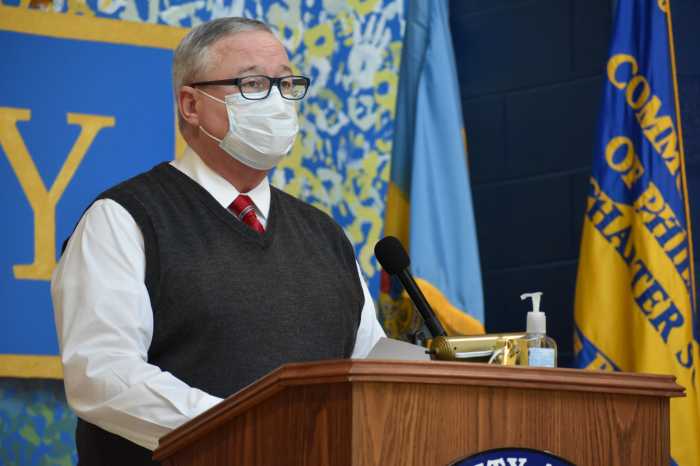Even more than two years into the pandemic, the mute button continues to wreak havoc.
After forgetting to silence her microphone, Tracey Gordon, the city’s register of wills, let out her unfiltered feelings following an exchange with City Councilmember Isaiah Thomas during a virtual budget hearing Wednesday morning.
“This guy is horrible,” Gordon could be heard saying. “F–k him.”
Prior to the uncensored outburst, Gordon had asked for a five-minute break, telling Council she had felt “harassed” and rushed by Thomas’s questions, which had to do with tangled property titles.
When the session resumed, Thomas explained he was hurrying Gordon because each council member has a limited amount of time — typically, seven minutes — to question department heads.
“Anybody who felt like I’m not being respectful… that’s not the intent,” he said. “At no time did it turn into anything that was inappropriate.”

Gordon is an independent elected official who oversees an office with a staff of 70 and a budget of around $4.6 million that handles wills, estates, marriage licenses and Orphans’ Court records.
Following Wednesday’s meeting, Gordon sent Metro a statement indicating she didn’t want the explicit comment to distract from her work, particularly around tangled titles, which has been a priority since she took office in 2020.
“In this day and age of virtual meetings and hot mics, we have all seen the unfortunate moments that can take place,” Gordon said. “I had a private moment that was public.
“I am a passionate person who cares deeply about keeping people in their family homes and helping citizens in need,” she continued. “However, that is no excuse for the language that was heard over my mic as we went to break, and I apologize.”
Thomas and a majority of councilmembers who participated in the hearing focused on the register’s Probate Deferment Initiative (PDI), which is aimed at aiding residents with tangled titles.
Titles can become murky when homes pass between generations of the same family without a formal will or deed transfer, or when rent-to-own agreements aren’t clear on who actually controls the property.
Philadelphia has more than 10,400 tangled titles and many of the homes are in low-income neighborhoods, according to a Pew Charitable Trusts report published last year.
PDI refers residents who make $50,000 or less to free legal assistance and defers probate and deed recording fees, only collecting the money if the property is sold.
Since the program started as a pilot in early 2021, 14 people have been able to untangle the titles to their homes, according to the register’s office.
Mayor Jim Kenney’s budget proposal includes $400,000 for PDI — up from $60,000 in the current fiscal year — which will allow the office to hire an attorney and a paralegal, as well as increase promotion and education efforts.
Gordon’s team is seeking an extra $125,000, which they told Council will allow the register’s office to hire three more legal professionals.
Near the end of the hearing, Thomas, who seemed disappointed that the program only benefited just over a dozen people, pressed Gordon to provide numbers on how many residents the register’s office could help with the additional money.
Representatives from the office did not provide a definitive answer, explaining untangling deeds can be complex, with attorneys forced to go back four or five generations in some cases.
“We need attorneys,” Gordon said. “It’s never going to be a lot unless we fund the program. That’s why we’re here.”
“I just don’t think it’s appropriate to come to Council to ask us for an increase in funding for a particular initiative and not be able to communicate to us what could we expect as it relates to outcomes from that initiative,” Thomas replied.
Council is in process of examining Jim Kenney’s spending plan by holding department-by-department budget hearings. Kenney and lawmakers must reach an agreement before June 30, the end of the fiscal year.






























